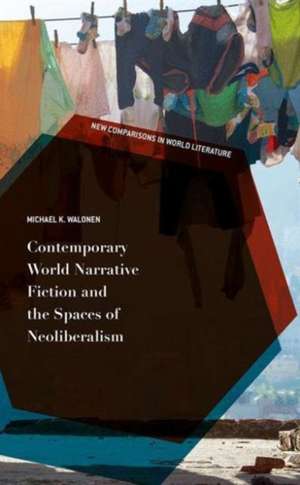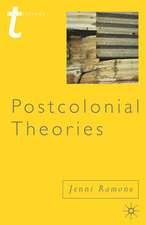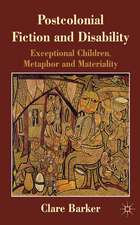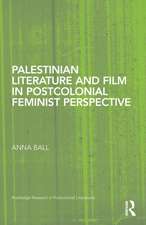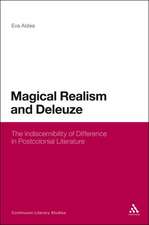Contemporary World Narrative Fiction and the Spaces of Neoliberalism: New Comparisons in World Literature
Autor Michael K. Walonenen Limba Engleză Hardback – 9 mai 2016
Din seria New Comparisons in World Literature
- 15%
 Preț: 695.85 lei
Preț: 695.85 lei - 15%
 Preț: 697.32 lei
Preț: 697.32 lei - 15%
 Preț: 584.10 lei
Preț: 584.10 lei - 15%
 Preț: 697.47 lei
Preț: 697.47 lei - 15%
 Preț: 636.76 lei
Preț: 636.76 lei - 15%
 Preț: 697.47 lei
Preț: 697.47 lei - 15%
 Preț: 585.40 lei
Preț: 585.40 lei - 9%
 Preț: 756.03 lei
Preț: 756.03 lei - 15%
 Preț: 529.28 lei
Preț: 529.28 lei - 15%
 Preț: 699.45 lei
Preț: 699.45 lei - 15%
 Preț: 498.79 lei
Preț: 498.79 lei -
 Preț: 386.99 lei
Preț: 386.99 lei - 15%
 Preț: 525.20 lei
Preț: 525.20 lei - 15%
 Preț: 579.84 lei
Preț: 579.84 lei -
 Preț: 383.12 lei
Preț: 383.12 lei -
 Preț: 388.52 lei
Preț: 388.52 lei - 18%
 Preț: 892.28 lei
Preț: 892.28 lei - 15%
 Preț: 639.08 lei
Preț: 639.08 lei - 15%
 Preț: 690.44 lei
Preț: 690.44 lei - 15%
 Preț: 697.32 lei
Preț: 697.32 lei - 15%
 Preț: 697.32 lei
Preț: 697.32 lei - 15%
 Preț: 699.77 lei
Preț: 699.77 lei - 15%
 Preț: 697.65 lei
Preț: 697.65 lei -
 Preț: 357.49 lei
Preț: 357.49 lei
Preț: 442.30 lei
Preț vechi: 480.76 lei
-8% Nou
Puncte Express: 663
Preț estimativ în valută:
84.63€ • 88.36$ • 70.05£
84.63€ • 88.36$ • 70.05£
Carte tipărită la comandă
Livrare economică 31 martie-07 aprilie
Preluare comenzi: 021 569.72.76
Specificații
ISBN-13: 9781137549549
ISBN-10: 1137549548
Pagini: 256
Ilustrații: VIII, 178 p.
Dimensiuni: 140 x 216 x 16 mm
Greutate: 0.35 kg
Ediția:1st ed. 2016
Editura: Palgrave Macmillan UK
Colecția Palgrave Macmillan
Seria New Comparisons in World Literature
Locul publicării:London, United Kingdom
ISBN-10: 1137549548
Pagini: 256
Ilustrații: VIII, 178 p.
Dimensiuni: 140 x 216 x 16 mm
Greutate: 0.35 kg
Ediția:1st ed. 2016
Editura: Palgrave Macmillan UK
Colecția Palgrave Macmillan
Seria New Comparisons in World Literature
Locul publicării:London, United Kingdom
Cuprins
Acknowledgments.- 1. Introduction.- PART I: BROAD TRENDS.- 2. Contemporary North American Narrative Fiction and the Landscapes of Neoliberalism: The Explosion of Corporate Capitalism and the Spaces of the Fallen American Middle Class.- 3. Speculation, Social Conflict, and the Ethics of Untrammeled Accumulation in the American Neoliberal Financier Novel.- 4. Spatial Division, Bricolage Settlement, and Informal Economies in the Developing World Slum Novel.- PART II: CASES IN POINT.- 5. Psycho-Geographic Orientation in the Neoliberal City: Establishing and Contesting Place Identity in the Nascent Literature of Dubai.- 6. Sense of Place, Consumer Capitalism, and the Sexual Politics of Global Nomadism in the Popular Fiction of Dubai.- 7. The Spatial/Political-Economic Dynamics of the Theme Park in Contemporary Transatlantic Fiction.- 8. Conclusion: Humanistic Study in a Time of Nightmare Economics.- Notes.- Bibliography.- Index.-
Notă biografică
Michael K. Walonen is Assistant Professor of English at Bethune-Cookman University, USA. He specializes in transatlantic modern and contemporary cultural studies, postcolonial studies, and world literature. He is the author of the book Writing Tangier in the Postcolonial Transition: Space and Power in Expatriate and North African Literature and articles that have appeared in the journals Interdisciplinary Literary Studies, ARIEL: A Review of International English Literature, LIT: Literature, Interpretation, Theory, Studies in Travel Writing, African Literature and Culture, and Frontiers: The International Journal of Study Abroad, as well as the collections Geocritical Explorations and On and Off the Page: Mapping in Text and Culture.
Textul de pe ultima copertă
This book is a transnational study of how contemporary fiction writers from the United States and Canada to Nigeria to India to Dubai have conceptualized the emergent social spaces of the diverse corners of the neoliberal world system. Over the span of the past three to four decades, free market economic policies have been sold to or pushed upon every society on the globe in some way, shape, or form. The upshot of this has been a world system structured in terms of a vast shift of power and resources from government to private enterprise, dwindling civic life replaced by rising consumerism, an emerging oligarchic rentier class, large segments of population faced with meager material conditions of existence and few prospects of socio-economic mobility, and a looming sense of a near future dominated by further economic collapses and mounting social strife. This book analyses a wide cultural array of some of the most poignant narrative engagements with neoliberalism in its various localized manifestations throughout the world.
